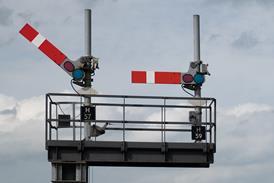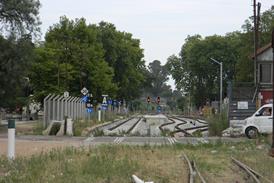RAILWAYS in Russia are recovering from the shock of a sudden transition to a market economy (p633). Significant progress is being made with a massive backlog of repairs and rehabilitation, but the demand is huge and is unlikely to be satisfied in the near future.
According to a report from Finmarket prepared for Transmash Holding, the market for production, upgrading and repair of rolling stock alone is set to double over the next five years to reach a value of US$5·4bn compared with US$2·6bn in 2004.
The report estimates that over the next five years Russian Railways and the newly-established private operators will need to obtain 5100 electric locomotives, 4100 main line diesel locos and 3900 shunters. Around 6700 loco-hauled passenger coaches will be required, together with 5000 EMU and 1500 DMU cars. No fewer than 230000 freight wagons will be needed.
During 2004 production of railway equipment increased by nearly 23%, with US$1·3bn spent on wagons, US$732m on passenger stock, US$180m on urban rail products and US$380m on locomotives. With new designs of main line locomotive available (RG 9.05 p537), the 2005 spend is forecast to grow by 75%.
The report suggests that domestic suppliers will dominate the market, with Ukrainian builders having a share of the wagon sector. Prominent among these is Transmash Holding, a group established in 2002 which includes Tver Carriage Works, Novercherkassk Electric Locomotive Plant, Bryansk Engineering Plant, Demikhovsky Engineering Plant, Oktyabrsky Electric Railway Car Plant and Penzadieselmash. The group has signed strategic long-term agreements with Russian Railways to supply more than US$6·5bn worth of products by 2010 and it is investing heavily in modernising its factories and in research and development.
In recent months Russian Railways has signed a number of important financial agreements, and syndication of a US$600m credit from a consortium of European banks is due to be completed this month. RZD Senior Vice-President Fedor Andreev confirmed on September 14 that two tranches of US$300m, for three and five years, would be agreed in the second half of October by Barclays Capital, Dresdener Kleinwort Wasserstein, HSBC Holdings and Raffeisen Zentralbank Österreich AG. The credit agreements will help to support RZD’s 2006 investment budget, which was agreed by the board on August 18.
Apparently absent from this package, however, is the €1·5bn of foreign loans that RZD envisaged would help fund its planned purchase of 60 high speed trains. RZD had signed an agreement earlier this year with Siemens under which the company would develop a broad gauge version of its Velaro design derived from the German ICE3. Siemens said on September 21 that it was still working on the development contract and that it remained ’very positive’ about signing a delivery contract - despite comments by RZD President Vladimir Yakunin on September 12 suggesting that the project had been deferred.




















